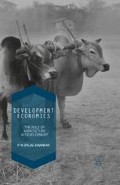Abstract
The paper explores the effects of imposing an agricultural tax based on inefficiency (the deviation of actual output from potential output). The analysis is carried out in the context of an abstract partial equilibrium model where a farmer has two sources of income: agricultural production and ‘usury income’. We derive three propositions on the basis of utility maximisation: (1) wealthier farmers lend a higher proportion of their wealth and use a lower proportion for productive activities; (ii) an increase in the inefficiency tax rate reduces money lending and increases the proportion of wealth productivity used; and (iii) an increase in the inefficiency tax rate increases output. A final section discusses the limitations of the analysis with suggestions for further research.
Access this chapter
Tax calculation will be finalised at checkout
Purchases are for personal use only
Preview
Unable to display preview. Download preview PDF.
References
Ali, A. A. G. (1974). On taxation and development: some aspects of taxation in a dual economy. (Unpublished University of Essex Ph.D).
Bardhan, P. K. (1980). Interlocking factor markets and agrarian development: A review of issues. Oxford Economic Papers, 32(1) pp. 82–98.
Berry, R. A. and Cline, W. R. (1979). Agrarian Structure and Productivity in Developing Countries. John Hopkins University Press, Baltimore & London.
Bhaduri, A. (1973). Agricultural backwardness under semi-feudalism. Economic Journal, 83, pp. 120–137.
Ghose, A. K. (1979). Farm size and land productivity in Indian agriculture: A reappraisal. Journal of Dev. Studies 16(1), pp. 22–49.
Chose, A. K. and Saith, A. (1976). Indebtedness, tenancy and the adoption of new technology in semi-feudal agriculture. World Development, 4, pp. 305–319.
Government of India (Ministry of Finance) (1972). Report of the committee on taxation of agricultural wealth and income. Chairman: Professor K. N. Raj. New Delhi, 1972.
Junankar, P. N. (1972). Land ceilings as a tax on agriculture. Economic & Political Weekly, VII(26), Review of Agriculture.
Nair, Kusum (1979). In Defence of the Irrational Peasant, University of Chicago Press, Chicago.
Newbery, D. M. G. (1975). Tenurial obstacles to innovation. Journal of Development Studies, 11, pp. 263–77.
Raj, K. N. (1973). Direct taxation of agriculture. Indian Economic Review, VIII(NS) 1, pp. 1–15.
Rao, C. H. Hanumantha (1972). Agricultural taxation: Raj committee’s report, Economic and Political Weekly, VII(48).
Toye, J. F. J. (1978). Equity versus ease in Indian land tax policy. In: Taxation and Economic Development, (ed.) J. R J. Toye, Frank Cass, London.
Copyright information
© 1986 The Indian Econometric Society
About this chapter
Cite this chapter
Chatterji, M., Junankar, P.N. (1986). Agricultural Taxation in Less Developed Countries: Effects of a Tax on Inefficiency. In: Development Economics. Palgrave Macmillan, London. https://doi.org/10.1057/9781137555229_5
Download citation
DOI: https://doi.org/10.1057/9781137555229_5
Publisher Name: Palgrave Macmillan, London
Print ISBN: 978-1-349-71714-9
Online ISBN: 978-1-137-55522-9
eBook Packages: Economics and FinanceEconomics and Finance (R0)

